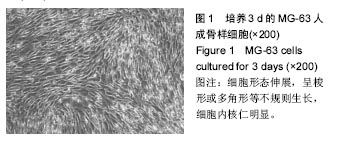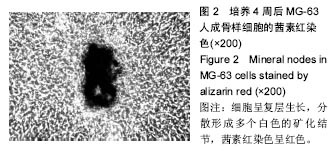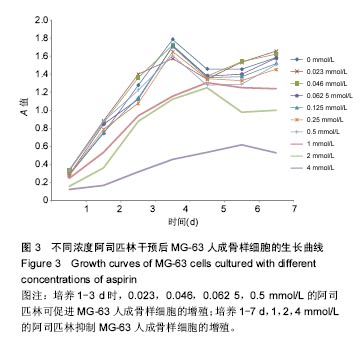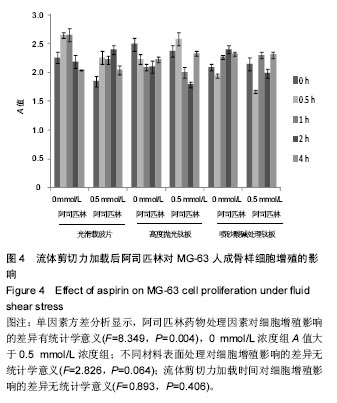| [1]Cooper LF.A role for surface topography in creating and maintaining bone at titanium endosseous implants.J Prosthet Dent.2000;84(5):522-534.[2]Soboyejo WO,Nemetski B,Allameh S,et al.Interactions between MC3T3-E1 cells and textured Ti6Al4V surfaces.J Biomed Mater Res.2002;62(1):56-72.[3]Buser D,Schenk RK,Steinemann S,et al.Influence of surface characteristics on bone integration of titanium implants. A histomorphometric study in miniature pigs.J Biomed Mater Res. 1991;25(7):889-902.[4]Anselme K,Bigerelle M.Statistical demonstration of the relative effect of surface chemistry and roughness on human osteoblast short-term adhesion.J Mater Sci Mater Med.2006; 17(5):471-479.[5]Martin JY,Schwartz Z,Hummert TW,et al.Effect of titanium surface roughness on proliferation, differentiation, and protein synthesis of human osteoblast-like cells (MG63.J Biomed Mater Res.1995;29(3):389-401.[6]Mamalis AA,Markopoulou C,Vrotsos I,et al.Chemical modification of an implant surface increases osteogenesis and simultaneously reduces osteoclastogenesis: an in vitro study.Clin Oral Implants Res. 2011;22(6):619-626.[7]宿玉成,耿威,戈怡,等.现代口腔种植学[Z].200464.[8]雷欣,李世轶,钟凡,等. 流体剪切力和表面处理对钛表面成骨细胞增殖的影响[J].广东牙病防治, 2015,23(6):285-288.[9]钟汉铭,杨晓喻,刘长虹,等.流体剪切力作用下喷砂酸碱处理钛表面对原代成骨细胞Wnt/β-catenin信号通路关键蛋白mRNA表达的影响[J].广东牙病防治,2013,21(5):229-233.[10]Hasturk H,Kantarci A,Ohira T,et al.RvE1 protects from local inflammation and osteoclast- mediated bone destruction in periodontitis.FASEB J.2006;20(2):401-403.[11]周磊,岳新新.All-on-Four技术在口腔种植领域中的应用进展[J].口腔疾病防治,2017,25(1):1-7.[12]Fu JH,Bashutski JD,Al-Hezaimi K,et al.Statins, glucocorticoids, and nonsteroidal anti-inflammatory drugs: their influence on implant healing.Implant Dent.2012;21(5): 362-367.[13]De Luna-Bertos E,Ramos-Torrecillas J,Garcia-Martinez O,et al.Effect of aspirin on cell growth of human MG-63 osteosarcoma line.ScientificWorldJournal.2012;2012:834246.[14]Trancik T,Mills W,Vinson N.The effect of indomethacin, aspirin, and ibuprofen on bone ingrowth into a porous-coated implant.Clin Orthop Relat Res.1989;(249):113-121.[15]Carbone LD,Tylavsky FA,Cauley JA,et al.Association between bone mineral density and the use of nonsteroidal anti-inflammatory drugs and aspirin: impact of cyclooxygenase selectivity.J Bone Miner Res.2003;18(10): 1795-1802.[16]牛二龙.小剂量阿司匹林对去势大鼠骨髓基质干细胞成骨分化的影响[D].第四军医大学,2013.[17]Hochmuth RM,Mohandas N,Blackshear PJ.Measurement of the elastic modulus for red cell membrane using a fluid mechanical technique.Biophys J.1973;13(8):747-762.[18]Apostu D,Lucaciu O,Lucaciu GD,et al.Systemic drugs that influence titanium implant osseointegration.Drug Metab Rev.2017;49(1):92-104.[19]Vane JR.Inhibition of prostaglandin synthesis as a mechanism of action for aspirin-like drugs. Nat New Biol. 1971;231(25):232-235.[20]Abate A,Yang G,Dennery PA,et al.Synergistic inhibition of cyclooxygenase-2 expression by vitamin E and aspirin.Free Radic Biol Med.2000;29(11):1135-1142.[21]Muller M,Raabe O,Addicks K,et al.Effects of non-steroidal anti-inflammatory drugs on proliferation, differentiation and migration in equine mesenchymal stem cells.Cell Biol Int. 2011;35(3):235-248.[22]Buckley MM,Brogden RN.Ketorolac. A review of its pharmacodynamic and pharmacokinetic properties, and therapeutic potential.Drugs.1990;39(1):86-109.[23]Chang JK,Li CJ,Liao HJ,et al.Anti-inflammatory drugs suppress proliferation and induce apoptosis through altering expressions of cell cycle regulators and pro-apoptotic factors in cultured human osteoblasts.Toxicology. 2009;258(2-3): 148-156.[24]Arikawa T,Omura K,Morita I.Regulation of bone morphogenetic protein-2 expression by endogenous prostaglandin E2 in human mesenchymal stem cells.J Cell Physiol.2004;200(3):400-406.[25]Chen ZW,Wu ZX,Sang HX,et al.Effect of aspirin administration for the treatment of osteoporosis in ovariectomized rat model.Zhonghua Yi Xue Za Zhi.2011; 91(13):925-929.[26]Yamaza T,Miura Y,Bi Y,et al.Pharmacologic stem cell based intervention as a new approach to osteoporosis treatment in rodents.PLoS One.2008;3(7):e2615.[27]王昌超,成业东,黄亚东,等.不同浓度阿司匹林对成骨细胞增殖的影响[J].山东医药,2015,55(44):28-29.[28]Guo Y,Zhang CY,Tian Y,et al.Effect of cyclooxygenase-2 on bone loss in ovariectomized rats. Zhonghua Fu Chan Ke Za Zhi.2012;47(6):458-462.[29]Li CJ,Chang JK,Wang GJ,et al.Constitutively expressed COX-2 in osteoblasts positively regulates Akt signal transduction via suppression of PTEN activity.Bone.2011; 48(2):286-297.[30]Fracon RN,Teofilo JM,Satin RB,et al.Prostaglandins and bone: potential risks and benefits related to the use of nonsteroidal anti-inflammatory drugs in clinical dentistry.J Oral Sci.2008; 50(3):247-252.[31]Urganus AL,Zhao YD,Pachman LM.Juvenile dermatomyositis calcifications selectively displayed markers of bone formation. Arthritis Rheum.2009;61(4):501-508.[32]Wei J,Wang J,Gong Y,et al.Effectiveness of combined salmon calcitonin and aspirin therapy for osteoporosis in ovariectomized rats.Mol Med Rep.2015;12(2):1717-1726.[33]刘显文,张超,刘曙光,等.骨保护素对去卵巢大鼠中种植体骨整合的影响[J].口腔疾病防治, 2016,24(11):634-639.[34]Ogata N,Chung UI,Tei Y,et al.Optimization of signaling pathways for bone regeneration.Clin Calcium. 2008;18(12): 1707-1712.[35]Chae YM,Heo SH,Kim JY,et al.Upregulation of smpd3 via BMP2 stimulation and Runx2.BMB Rep. 2009;42(2):86-90.[36]Krishnan V,Bryant HU,Macdougald OA.Regulation of bone mass by Wnt signaling.J Clin Invest. 2006;116(5):1202-1209.[37]钟汉铭.流体剪切力对不同钛表面成骨细胞Wnt/β-catenin信号通路关键成员表达的影响[D].南方医科大学,2013.[38]吴丹,丁寅,王琪.流体剪切力对大鼠成骨细胞增殖及细胞周期的影响[J].临床口腔医学杂志,2007,23(4):197-199.[39]Coleman ML,Marshall CJ,Olson MF.Ras promotes p21(Waf1/Cip1) protein stability via a cyclin D1-imposed block in proteasome-mediated degradation.EMBO J.2003;22(9): 2036-2046. |
.jpg)




.jpg)